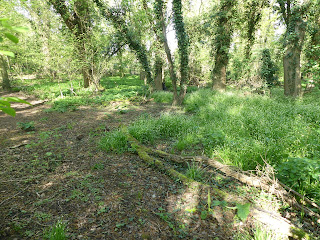Few Flowered Leek/Garlic - Alium paradoxum, is well established in the north west corner of the Park. See the area marked in red.
This plant is a native of the Caucasus and probably came to this country along with imported potted plants. In our case, it may well have come from the Rivers Nursery where it is also established. It is an almost perfect invasive species . It does not have proper flowers and does not need pollinating in order to reproduce, instead, it produces firstly a prolific number of 'bulbils' in the flower head and secondly offsets from the main bulb in the ground. Nothing eats it (apart from humans!) because it has a strong smell and is distasteful. And lastly, it forms such dense clumps that it shades out any other plant including native ones which should be there.
The 'flower' and bulbils.
Bulbs in the ground and 'offsets'.
Masses of bulbs in the ground lead to a very dense clump which excludes other vegetation.
Invasion starts, presumably from a is single bulbil from a flower. Initially there is a single leaf but as the bulbs multiply in the ground the size of clump steadily increases. A single bulbil in the centre of native Dogs Mercury will soon overwhelm the plant that should be growing there.



















No comments:
Post a Comment